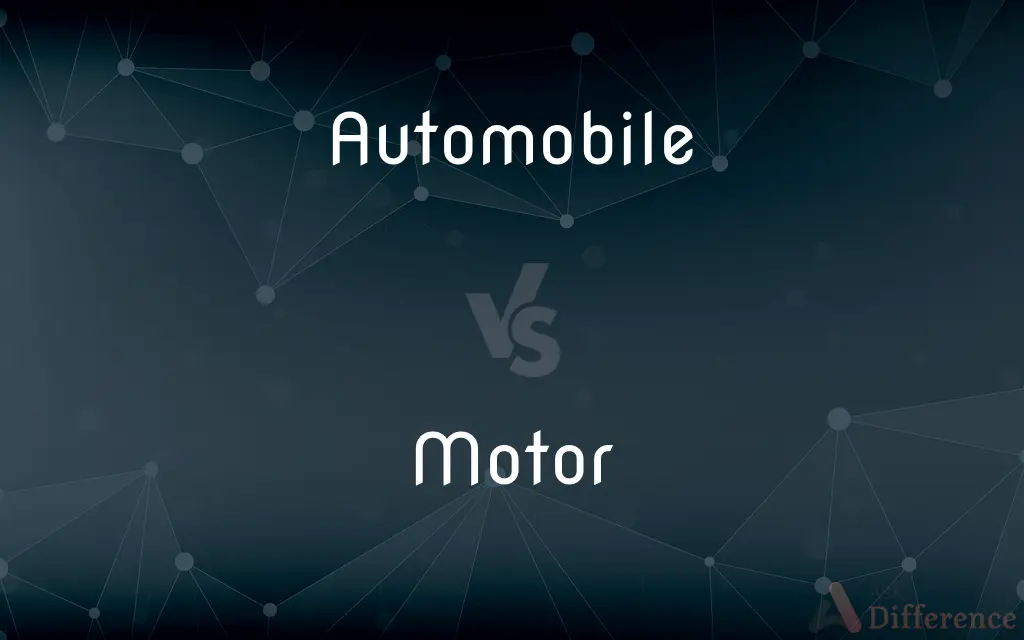Automobile vs. Motor — What's the Difference?
By Fiza Rafique & Maham Liaqat — Updated on April 20, 2024
An "automobile" is a vehicle designed for road transport, typically powered by an engine or motor, while a "motor" is a device that converts electrical or chemical energy into mechanical energy to power various machines, including automobiles.

Difference Between Automobile and Motor
Table of Contents
ADVERTISEMENT
Key Differences
An automobile refers broadly to vehicles like cars, trucks, and buses that are equipped for road use and primarily transport people or goods. In contrast, a motor is a component found within various machines, including automobiles, which generates the mechanical power needed for operation.
The primary function of an automobile is transportation, serving as a self-contained unit for moving from one location to another, often equipped with multiple features for safety, comfort, and performance. On the other hand, a motor's role is to provide the kinetic energy necessary for any machine's movement or function, making it a crucial component in many technologies beyond just vehicles.
Automobiles come in various forms and sizes, from small cars to large trucks, each designed for specific transportation needs. Motors also vary significantly in type and size, from tiny motors in household appliances to large engines in ships or industrial machinery.
In terms of dependency, an automobile typically depends on a motor to function as its power source—whether it’s an internal combustion engine or an electric motor. Conversely, motors are not exclusive to automobiles and are essential components in countless other applications.
The development of automobiles has been significantly shaped by advancements in motor technology. Improvements in motor efficiency, size, and power have directly influenced automobile design, fuel efficiency, and capabilities, reflecting a close but distinct relationship between the two.
ADVERTISEMENT
Comparison Chart
Definition
A vehicle designed for road transport.
A device that converts energy into mechanical force.
Primary Use
Transportation of people and goods.
Power generation for various applications.
Types
Cars, trucks, buses.
Electric motors, internal combustion engines.
Dependency
Depends on a motor for propulsion.
Used in various devices, not just automobiles.
Technological Impact
Influenced by motor efficiency and innovation.
Essential for the operation of many machines.
Compare with Definitions
Automobile
Includes features for safety, comfort, and performance.
Modern automobiles offer advanced safety features like automatic braking.
Motor
Varies widely in size and type depending on its application.
Industrial motors are much larger and more powerful than those in home appliances.
Automobile
Often reflects cultural and economic status.
Luxury automobiles are a symbol of wealth and status.
Motor
Can be powered by electricity, gasoline, or other energy sources.
Electric motors are becoming more popular in green technologies.
Automobile
Can be classified into various types like sedans, SUVs, and trucks.
His automobile is a compact sedan, ideal for city driving.
Motor
Integral to the functioning of various machines.
Every electric fan has a motor that allows the blades to rotate.
Automobile
Designed for personal and commercial transportation.
Automobiles have revolutionized how we commute and travel.
Motor
Constantly evolving with technological advances.
Innovations in motor technology have led to more efficient electric vehicles.
Automobile
A self-propelled passenger vehicle that usually has four wheels and an internal-combustion engine, used for land transport. Also called motorcar.
Motor
Converts energy into mechanical power.
The motor in the washing machine drives the spinning cycle.
Automobile
Of or relating to automobiles; automotive.
Motor
Something, such as a machine or an engine, that produces or imparts motion.
Automobile
A type of vehicle designed to move on the ground under its own stored power and intended to carry a driver, a small number of additional passengers, and a very limited amount of other load. A car or motorcar.
Motor
A device that converts any form of energy into mechanical energy, especially an internal-combustion engine or an arrangement of coils and magnets that converts electric current into mechanical power.
Automobile
To travel by automobile.
Motor
A motor vehicle, especially an automobile
"It was a night of lovers. All along the highway ... motors were parked and dim figures were clasped in revery" (Sinclair Lewis).
Automobile
Self-moving; self-propelled.
Motor
Causing or producing motion
Motor power.
Automobile
A self-propelled vehicle used for transporting passengers, suitable for use on a street or roadway. Many diferent models of automobiles have beenbuilt and sold commercially, possessing varied features such as a retractable roof (in a convertible), different braking systems, different propulsion systems, and varied styling. Most models have four wheels but some have been built with three wheels. Automobiles are usually propelled by internal combustion engines (using volatile inflammable liquids, as gasoline or petrol, alcohol, naphtha, etc.), and sometimes by steam engines, or electric motors. The power of the driving motor varies from under 50 H. P. for earlier models to over 200 H. P. larger models or high-performance sports or racing cars. An automobile is commonly called a car or an auto, and generally in British usage, motor cars.
Motor
Driven by or having a motor.
Automobile
To travel in an automobile.
Motor
Of or for motors or motor vehicles
Motor oil.
Automobile
4-wheeled motor vehicle; usually propelled by an internal combustion engine;
He needs a car to get to work
Motor
Of, relating to, or designating nerves that carry impulses from the nerve centers to the muscles.
Automobile
Travel in an automobile
Motor
Involving or relating to movements of the muscles
Motor coordination.
A motor reflex.
Automobile
Road vehicle typically powered by an internal combustion engine or electric motor.
She drove her automobile to work every day.
Motor
To drive or travel in a motor vehicle.
Motor
To carry by motor vehicle.
Motor
A machine or device that converts other energy forms into mechanical energy, or imparts motion.
Motor
(colloquial) A motor car, or automobile, even a goods vehicle.
Nice motor!
Motor
(figuratively) A source of power for something; an inspiration; a driving force.
Motor
Any protein capable of converting chemical energy into mechanical work.
Motor
The controller or prime mover of the universe; God.
Motor
(prison slang) The fermenting mass of fruit that is the basis of pruno, or "prison wine".
Motor
(biology) Relating to the ability to move.
She has excellent motor skills.
Motor
Relating to motor cars.
Motor insurance is expensive for youngsters.
Motor
(nautical) Propelled by an internal combustion engine as opposed to a steam engine or turbine.
Motor
(dated) To make a journey by motor vehicle; to drive.
On Saturday we motored down to Plymouth.
Motor
To rotate a jet engine or turboprop using the engine's starter, without introducing fuel into the engine.
During startup, the engine should be motored for 20 to 30 seconds to allow the shafts to straighten out, as they may have become bowed under their own weight while the airplane was sitting on the ground.
Motor
To progress at a brisk pace.
Sales were slow at first, but now things are really motoring.
Motor
(slang) To leave.
I gotta motor.
Motor
One who, or that which, imparts motion; a source of mechanical power.
Motor
A prime mover; a machine by means of which a source of power, as steam, moving water, electricity, etc., is made available for doing mechanical work.
Motor
A motor car; an automobile.
Motor
Causing or setting up motion; pertaining to organs of motion; - applied especially in physiology to those nerves or nerve fibers which only convey impressions from a nerve center to muscles, thereby causing motion.
Motor
Machine that converts other forms of energy into mechanical energy and so imparts motion
Motor
A nonspecific agent that imparts motion;
Happiness is the aim of all men and the motor of all action
Motor
Travel or be transported in a vehicle;
We drove to the university every morning
They motored to London for the theater
Motor
Conveying information to the muscles from the CNS;
Motor nerves
Motor
Causing or able to cause motion;
A motive force
Motive power
Motor energy
Common Curiosities
Can an automobile function without a motor?
No, an automobile requires a motor to provide the propulsion necessary for movement.
What types of motors are used in automobiles?
Automobiles typically use internal combustion engines or electric motors.
What is the primary purpose of an automobile?
The primary purpose of an automobile is to provide road transportation for people and goods.
How have electric motors changed the automobile industry?
Electric motors have introduced new possibilities for energy efficiency, reducing reliance on fossil fuels and decreasing emissions.
How does a motor function within an automobile?
Within an automobile, a motor converts energy (like gasoline or electricity) into mechanical power that drives the vehicle's wheels.
What future trends are expected in motor technology for automobiles?
Future trends include further improvements in electric motor efficiency, greater integration of renewable energy sources, and advancements in battery technology.
Are motors used in industries other than automotive?
Yes, motors are used in a wide range of industries, including manufacturing, aerospace, and consumer electronics.
What advancements in motor technology have impacted automobiles?
Advances in electric motor efficiency and hybrid technology have significantly impacted the design and fuel efficiency of modern automobiles.
What environmental impacts are associated with motors in automobiles?
Motors, especially internal combustion engines, are major contributors to air pollution and CO2 emissions.
How do the costs of motors affect the automobile industry?
The cost and availability of motors directly affect the production and pricing of automobiles.
Share Your Discovery

Previous Comparison
Plan vs. Purvey
Next Comparison
Aroma vs. SmellAuthor Spotlight
Written by
Fiza RafiqueFiza Rafique is a skilled content writer at AskDifference.com, where she meticulously refines and enhances written pieces. Drawing from her vast editorial expertise, Fiza ensures clarity, accuracy, and precision in every article. Passionate about language, she continually seeks to elevate the quality of content for readers worldwide.
Co-written by
Maham Liaqat













































